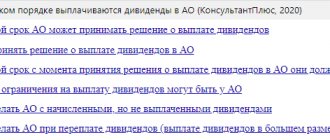What taxes must a Russian company pay when paying dividends to a foreign investor - an individual or a company?
Before moving on to complex tax issues related to the distribution of dividends, let’s define the very concept of “dividends”. Let us note that the civil legislation of the Russian Federation does not contain a clear definition of “dividends”.
In particular, the Federal Law of 02/08/1998 No. 14-FZ “On Limited Liability Companies” does not contain the concept of “dividends”. Law No. 14-FZ reports on the distribution of income between participants.
In paragraph 1 of Art. 42 of the Federal Law of December 26, 1995 No. 208-FZ “On Joint-Stock Companies” it is noted that a joint-stock company has the right to make decisions (announce) on the payment of dividends on placed shares.
Important!
At the same time, the concept of “dividend” used for tax purposes is broader than in civil law.
The definition of dividends for tax purposes is given in paragraph 1 of Art. 43 of the Tax Code of the Russian Federation: “a dividend is any income received by a shareholder (participant) from an organization during the distribution of profits remaining after taxation on the shares (shares) owned by the shareholder (participant) in proportion to the shares of the shareholders of the participants) in the authorized (joint) capital of this organization.
Dividends also include any income received from sources outside the Russian Federation that are classified as dividends in accordance with the laws of foreign countries.” That is, in both JSC and LLC, the income in question is called a dividend.
The difference between the civil law term “dividends” and “dividends for tax purposes” occurs in several ways:
- by subject of payment (not only joint-stock companies, but also other companies);
- by the recipient entity (not only a shareholder, but also a participant);
- by source of payment (not only payments when distributing the net profit of the current year, but also any other income received by the shareholder (participant) from the organization when distributing net profit, including retained earnings of previous years, payments in excess of the down payment upon liquidation of the company) .
The only common criteria remain:
- proportionality of payments to the size of participation in the authorized capital of the organization;
- making payments at the expense of the company’s assets, free from obligations, both civil and tax, i.e. net profit.
It is this approach to terminology that is used when considering judicial disputes (for example, the resolution of the Volga District Court of Justice dated February 12, 2015 No. A72-1862/2014, the determination of the West Siberian District Court of Justice dated March 25, 2015 No. A27-16327/2013).
Regulations
The main document that should be followed when paying income to participants in an enterprise is the Tax Code of the Russian Federation, and specifically.
When it comes to foreign founders, it should be taken into account that the Russian Federation has treaties on the elimination of double taxation with a number of countries, and if the owner of part of the business is a resident of one of these countries, then taxes are calculated in accordance with these treaties. The list of countries is extensive and is definitely worth checking out.
So, Russia has treaties on the elimination of double taxation with the following countries:
| Europe | Austria, Albania, Belarus, Belgium, Bulgaria, Great Britain, Hungary, Germany, Greece, Denmark, Ireland, Spain, Italy, Iceland, Cyprus, Lithuania, Latvia, Luxembourg, Macedonia, Malta, Moldova, the Netherlands, Norway, Poland, Portugal, Romania, Slovenia, Slovakia, Ukraine, Finland, France, Croatia, Czech Republic, Sweden, Switzerland, Yugoslavia |
| Asia | Azerbaijan, Armenia, Vietnam, Israel, Iran, India, Kazakhstan, Qatar, Kyrgyzstan, China, special administrative region of China - Hong Kong, North Korea, Korea, Kuwait, Lebanon, Mongolia, United Arab Emirates, Saudi Arabia, Syria, Singapore, Tajikistan, Turkmenistan, Turkey, Uzbekistan, Sri Lanka, Japan |
| America | Canada, Cuba, Mexico, USA, Chile |
| Africa | Algeria, Botswana, Mali, Morocco, Namibia, South Africa |
| Oceania | Australia, Indonesia, Malaysia, New Zealand, Philippines. |
Dividends to a non-resident legal entity are paid after determining the size of the enterprise's profit.
EXAMPLE No. 2
According to paragraphs. a) clause 2 of Art. 10 of the Agreement between the Government of the Russian Federation and the Government of the Republic of Cyprus dated December 5, 1998 “On the avoidance of double taxation with respect to taxes on income and capital”, income received from dividends paid by a company that is a resident of one Contracting State to a resident of another Contracting State may be taxed tax in the first-mentioned State in an amount not exceeding 5% of the total amount of the dividends if the beneficial owner has directly invested in the capital of the company an amount equivalent to US$100,000. And if this condition is met, then the company receives the right to apply a reduced rate of 5%. True, compliance with the terms of the contract sometimes has to be proven in court (resolution of the Administrative Court of the East Siberian District dated June 3, 2014 No. A19-3772/2013).
Important!
When applying a preferential rate for income tax, the tax agent (i.e. the Russian party) paying the income, in order to apply the provisions of international treaties of the Russian Federation, has the right to request confirmation from a foreign organization that this organization has the actual right to receive the corresponding income (letter from the Ministry of Finance of the Russian Federation dated November 30, 2015 No. 03-08-05/69413).
Individuals receiving income from sources in the Russian Federation are recognized as payers of personal income tax (NDFL) (clause 1 of Article 207 of the Tax Code of the Russian Federation). The tax is calculated at a rate of 15% (clause 3 of Article 224 of the Tax Code of the Russian Federation). In fact, a Russian organization paying income to a foreigner in the form of dividends will have to pay personal income tax (letter of the Ministry of Finance of the Russian Federation dated April 21, 2017 No. 03-04-05/24255).
According to clause 1 of Article 226 of the Tax Code of the Russian Federation, Russian organizations from which or as a result of relations with which the taxpayer received income are required to calculate, withhold from the taxpayer and pay the amount of personal income tax. The exception is income for which the calculation and payment of tax are carried out in accordance with Art. Art. 214.1, 227, 227.1 and 228 of the Tax Code of the Russian Federation. A Russian company must pay personal income tax on dividends no later than the day the dividends are transferred to the recipient (clause 6 of Article 226 of the Tax Code of the Russian Federation).
Important!
The personal income tax rate on dividends in favor of non-resident individuals of the Russian Federation is 15% (clause 3 of Article 224 of the Tax Code of the Russian Federation). The income tax rate on dividends in favor of non-resident companies of the Russian Federation is 15% (clause 3, clause 3, article 284 of the Tax Code of the Russian Federation). However, an international agreement between the Russian Federation and the country where a non-resident Russian company is registered may provide for a reduced tax rate.
Now let's move on to considering controversial issues related to the calculation and payment of dividends.
AUDIT AND ACCOUNTING SERVICES
The procedure for determining net profit
Net profit is one of the main performance indicators of an enterprise. There are several formulas for calculating it. But the general essence is that this is the total revenue of the enterprise excluding all its expenses and taxes paid.
Net profit should be calculated according to the accounting rules set out in letters of the Ministry of Finance No. 03-11-06/2/147 (dated September 20, 2010) and No. 03-11-06/2/134 (dated August 20, 2010) .
It must be taken into account that the distribution of net profit as dividends is not always allowed. Cases when such distribution is prohibited for legal entities of various forms of ownership are set out in the relevant acts:
- for LLCs they are contained in Article 29 No. 14-FZ dated 02/08/1998;
- for JSC - in No. 208-FZ dated December 26, 1995.
To prevent misunderstandings with the tax authorities, it is recommended to create a certificate on the day of making a decision on the distribution of dividends stating that there are no grounds not to allow such a decision.
EXAMPLE No. 1
When paying dividends to a foreign Austrian company, a Russian organization has the right to apply a profit tax rate of 5 percent due to the Convention between the Government of the Russian Federation and the Government of the Republic of Austria of April 13, 2000 “On the avoidance of double taxation with respect to taxes on income and capital.”
True, the use of a reduced tax rate often comes to the attention of the tax authorities and the right to use it has to be proven in court (Resolution of the Administrative Court of the North-Western District dated 04/07/2016 No. F07-2451/2016).
PLANNED CHANGES IN CONCERNING THE APPROVAL OF LARGE TRANSACTIONS IN WHICH THERE IS AN INTEREST
How are dividend payments processed?
Enterprises can decide to distribute dividends once a quarter, once every six months or once a year. However, a full calculation of net profit is made only at the end of the financial year.
All financial results of the company for the year are determined at the general meeting of shareholders or participants. The period for holding such meetings for LLCs is set from March 1 to April 30. Joint stock companies must hold meetings from March 1 to June 30.
The general meeting of participants/shareholders must decide:
- what part of the net profit will be used to pay dividends;
- in what order this amount will be distributed among shareholders or participants.
- when should payments be made?
The decision is formalized by the minutes of the general meeting or by order or decision of the sole founder on the payment of dividends.
Chart of accounts
The accrual and payment of dividends is reflected in 1C in account 75.02 “Calculations for payment of income”.
Accounting is maintained for each founder (participant) in the subaccount Founders .
Each founder (participant) is selected from:
- directory Counterparties (for legal entities);
- directory Individuals.
Account 68.34 “Income tax when performing the duties of a tax agent” is intended for separate accounting of income tax when performing the duties of a tax agent for dividends.
Payment distribution procedure
After determining net profit and deciding on its distribution as dividends, it must be divided among all shareholders or participants. Most often, division is carried out in accordance with the share of each of them. For example, if the founder has 50% of the authorized capital, then his share in dividends is equal to 50%.
Another option: when the procedure for profit distribution is stipulated in the organization’s statutory documents.
Legal regulation of the status of a resident of the Russian Federation
According to current legislation, a citizen is considered a resident of the Russian Federation provided that during the last 12 calendar months he stayed in Russia for at least 183 days.
The period of stay in the customs territory of the Russian Federation is the only criterion for determining residency. Nationality and citizenship are not key indicators in this case. Thus, a foreigner or a stateless person can be recognized as a resident of the Russian Federation, provided that he stayed in the Russian Federation for at least 183 days.
The set period (183 days) can be calculated either continuously or cumulatively. For example, a citizen who in 2021 was in Russia from 01/01/2021 to 04/30/2021, after which he was in Azerbaijan until 08/31/2021 inclusive, after which he returned to Russia again, is recognized as a resident of the Russian Federation. The rationale in this case is as follows - the total period of stay of a citizen in the Russian Federation (from 01/01/2021 to 04/30/2021 and from 09/01/2021 to 12/31/2021) is summed up to 242 days, which is the required value (183 days or more).
In accordance with the law, a citizen is considered a resident unless circumstances establish otherwise. For example, a citizen who is employed by a Russian enterprise and has worked there for a calendar year is automatically recognized as a resident.
If there are facts that may call a citizen’s residency into question, then the resident status can be confirmed documentaryly - a border crossing mark in the passport.
In what forms are dividends paid?
Payment of dividends to a non-resident legal entity can be made in several forms. These can be direct cash payments, or some property transferred into his ownership. In the latter case, the possibility of settlements in this way must be indicated in the constituent documents of the organization.
Quite popular is the payment of dividends in the form of shares of the enterprise itself. In the 1990s, this practice was carried out widely in Russia, however, with amendments to paragraph 5 of Art. 25 of the Federal Law “On Joint-Stock Companies” in 2001 it lost its expediency and is now rarely used.
Procedure and timing of payments
The timing and order in which payments will be made depends on the legal form of the company. Limited liability companies are required to make settlements no later than 60 days after the decision is made. However, other temporary norms may also be included in the charter documents of an LLC.
In joint stock companies, the timing is determined by the status of the shareholder and the time of decision making. Specific deadlines are established in Article 42 of the Federal Law “On Joint-Stock Companies”. In both cases, payments must be made in cashless form. It is possible for a foreign parent company to receive dividends by proxy.
Taxes on dividends
27 Khabarovsk Territory Publication date: 03/12/2019
Edition: Information monthly “The Right Decision” issue No. 02 (196) dated 02/20/2019. Topic: Income tax Source: https://www.consultant-dv.ru/periodika/gazeta-vernoe-reshenie/vypusk-02-20-02-19/nalogi-s-dividendov/
According to Art. 43 of the Tax Code of the Russian Federation (hereinafter referred to as the Tax Code of the Russian Federation), a dividend is any income received by a shareholder (participant) from an organization when distributing profits remaining after taxation (including in the form of interest on preferred shares) on shares owned by the shareholder (participant) ( shares) in proportion to the shares of shareholders (participants) in the authorized (joint) capital of this organization.
In accordance with paragraph 1 of Article 24 of the Tax Code of the Russian Federation, tax agents are persons who, in accordance with the Code, are entrusted with the responsibility for calculating, withholding from the taxpayer and transferring taxes to the budget system of the Russian Federation.
Moreover, in accordance with paragraph 3 of Article 275 of the Tax Code of the Russian Federation, a Russian organization that is a source of income for the taxpayer in the form of dividends is recognized as a tax agent for corporate income tax.
With respect to income in the form of dividends on shares issued by a Russian organization, the tax agent must determine the amount of tax separately for each taxpayer in relation to each payment of dividends.
Income tax is calculated and withheld when dividends are paid. Tax is not withheld from accrued but unpaid dividends (clause 3 of Article 275 of the Tax Code of the Russian Federation).
The specifics of determining the tax base for income received from equity participation in other organizations are determined by Article 275 of the Tax Code of the Russian Federation.
The procedure for calculating corporate income tax on dividends depends on whether the organization receives dividends from other companies, as well as on the status of the taxpayer (Russian or foreign company) - the recipient of the dividends.
If a Russian organization that distributes dividends does not receive dividends from other companies and pays income to a taxpayer who is a tax resident of the Russian Federation, then the tax is calculated according to the formula (clause 5 of Article 275 of the Tax Code of the Russian Federation).
If dividends were not received from other organizations, then they are not taken into account when calculating income tax. Consequently, the tax is calculated on the amount of dividends accrued in favor of the organization.
This procedure is enshrined in paragraphs 5 and 6 of Article 275 of the Tax Code of the Russian Federation.
According to paragraph 3 of Article 284 of the Tax Code of the Russian Federation, dividends are subject to income tax at the following rates:
· 0% – when paying dividends to Russian organizations if they meet certain criteria;
· 13% – when paying dividends to other Russian organizations;
· 15% – when paying dividends to foreign organizations.
This rate is applied if there is no agreement on the avoidance of double taxation between the Russian Federation and the state of the recipient of dividends or other rates are not established by such agreement (clause 3 of Article 310 of the Tax Code of the Russian Federation).
In this case, an international agreement between the Russian Federation and the state of the recipient of dividends may provide for a different rate. In this case, the rate established by the agreement is used (Article 7, paragraph 6 of Article 275, paragraph 3 of Article 310 of the Tax Code of the Russian Federation). To do this, a foreign organization must submit supporting documents to the organization paying dividends (clause 1 of Article 312 of the Tax Code of the Russian Federation):
· a document confirming its permanent location in a state with which an international treaty has been concluded;
· a document confirming the actual right of a foreign organization to receive income.
A 0% rate on dividends can be applied if the Russian organization - the recipient has owned for at least 365 consecutive calendar days (subclause 1 of clause 3 of Article 284 of the Tax Code of the Russian Federation):
· a share of 50% or more in the authorized capital of the organization that pays dividends;
· or depositary receipts that give the right to dividends in the amount of 50% or more of the total amount of dividends to be paid.
These conditions must be met at the time the decision to pay dividends is made.
If dividends are received by a Russian organization from a foreign organization, then a 0% rate can be applied under the additional condition: the foreign company is not located in an offshore zone (subclause 1 of clause 3 of Article 284 of the Tax Code of the Russian Federation). The list of such zones was approved by Order of the Ministry of Finance of Russia dated November 13, 2007 No. 108n. Compliance with this condition must be verified on the day the decision to pay dividends is made.
The recipient of dividends must confirm the right to apply the zero rate. To do this, he must submit to the organization paying the dividends: a copy of the written notice of the right to apply the zero rate, which the recipient of the dividends sent to the tax office;
· documents with information about the date of acquisition of a deposit or share in the authorized capital or the right to depositary receipts. An approximate list of such documents is given in paragraph 3 of Article 284 of the Tax Code of the Russian Federation. These may be purchase and sale (exchange) agreements, decisions on the placement of securities, prospectuses, decisions on reorganization, extracts from the personal accounts of the register of shareholders, statements on the “depo” account, etc.;
· confirmation that the recipient of the dividends sent the above documents and notification to the tax authority.
Income tax on dividends is withheld upon payment. In accordance with paragraph 4 of Article 287 of the Tax Code of the Russian Federation, tax must be transferred to the budget no later than the next working day after the payment of dividends.
The current legislation regulating the distribution of profits between its participants (Federal Law dated December 26, 1995 No. 208-FZ “On Joint-Stock Companies”, Federal Law dated February 8, 1998 No. 14-FZ “On Limited Liability Companies”) allows for the possibility of paying distributed net profit and dividends in non-monetary form - property (in particular, goods, finished products, real estate, property rights with a monetary value).
When transferring property (property rights) as dividends, the ownership of the transferred property (property rights) passes to the shareholder.
In accordance with paragraph 4 of Article 274 of the Tax Code of the Russian Federation, income received in kind as a result of the sale of property rights is taken into account, unless otherwise provided by the Code, based on the transaction price, taking into account the provisions of Article 105.3 of the Tax Code of the Russian Federation.
Thus, when paying dividends in kind, the organization must transfer tax to the budget in the amount calculated in accordance with paragraph 2 of Article 275 of the Tax Code of the Russian Federation, transferring property with a value equal to dividends reduced by the amount of corporate income tax.
Considering that, according to paragraph 1 of Article 43 of the Tax Code of the Russian Federation, a dividend is recognized as income received by a shareholder (participant) in proportion to the shares of shareholders (participants) in the authorized (joint) capital of the organization distributing profits, then in the event of a disproportionate distribution of the company’s net profit, the part of the company’s net profit distributed between its participants disproportionately to their shares in the authorized capital of the company, is not recognized as dividends for tax purposes.
Consequently, these payments in excess of the amount of dividends determined taking into account the provisions of paragraph 1 of Article 43 of the Tax Code of the Russian Federation are taken into account for the purposes of taxing the profits of organizations when determining the tax base to which the rate provided for in paragraph 1 of Article 284 of the Tax Code of the Russian Federation is applied.
When an organization applying a special tax regime (USN, Unified Agricultural Tax, UTII) pays income in the form of dividends to other organizations applying both general and special taxation regimes, such an organization is obliged in the generally established manner to calculate, withhold at the source of payment and transfer the corresponding tax to the budget .
Step-by-step instruction
On March 28, the general meeting of the founders of the Organization decided to distribute the profit received for 2021 in the amount of 2,000,000 rubles. in favor of the following founders:
- Russian legal entity Karandash LLC, which owns a 50% share of the authorized capital of the company 6 months - 1,000,000 rubles;
- individual (resident of the Russian Federation) Ivanov Alexander Pavlovich, an employee of the organization who owns a 35% share of the authorized capital of the company - 700,000 rubles;
- individual (non-resident of the Russian Federation) Kutuzov Alexander Pavlovich, who owns a 15% share of the authorized capital of the company - 300,000 rubles.
The organization as a tax agent calculates and withholds:
- income tax on income in the form of dividends of a legal entity in the amount of 13%;
- Personal income tax on income in the form of dividends of an individual resident of the Russian Federation in the amount of 13%;
- Personal income tax on income in the form of dividends of an individual non-resident of the Russian Federation in the amount of 15%.
The organization did not receive dividends from other legal entities.
Step-by-step instructions for creating an example. PDF
| Debit | Credit | Accounting amount | Amount NU | the name of the operation | Documents (reports) in 1C | ||
| Dt | CT | ||||||
| Calculation of dividends to an individual resident of the Russian Federation | |||||||
| March 28 | 84.01 | 75.02 | 700 000 | Calculation of dividends | Calculation of dividends | ||
| 75.02 | 68.01 | 91 000 | Personal income tax on dividends | ||||
| Calculation of dividends to an individual non-resident of the Russian Federation | |||||||
| March 28 | 84.01 | 75.02 | 300 000 | Calculation of dividends | Calculation of dividends | ||
| 75.02 | 68.01 | 45 000 | Personal income tax on dividends | ||||
| Calculation of dividends to a Russian legal entity | |||||||
| March 28 | 84.01 | 75.02 | 1 000 000 | Calculation of dividends | Calculation of dividends | ||
| 75.02 | 68.34 | 130 000 | Income tax on dividends | ||||
| Dividend payment | |||||||
| March 28 | 75.02 | 51 | 1 734 000 | Dividend payment | Debiting from the current account - Transfer of dividends | ||
| Payment of personal income tax on dividends | |||||||
| March 28 | 68.01 | 51 | 136 000 | Payment of personal income tax to the budget | Debiting from a current account – Tax payment | ||
| Payment of income tax on dividends | |||||||
| March 28 | 68.34 | 51 | 130 000 | Payment of income tax to the budget | Debiting from a current account – Tax payment | ||







